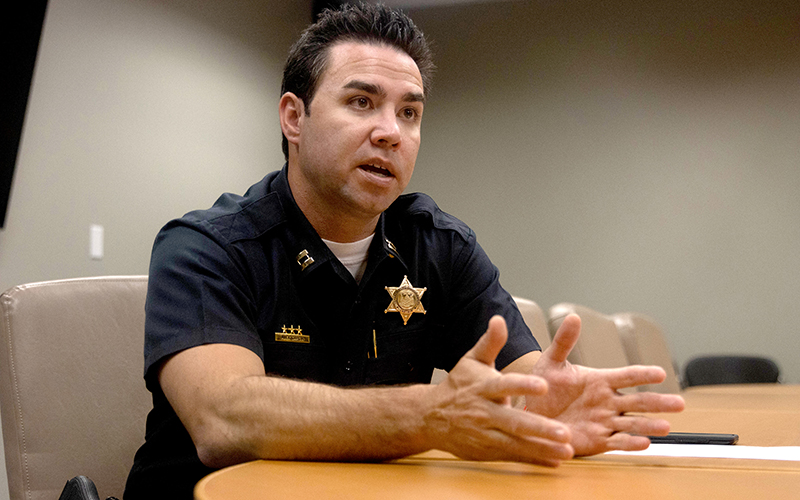SALT LAKE CITY – Providing public information about police misconduct records can be a messy process.
There’s no federal database on misconduct, and most states don’t have a comprehensive one either. In addition, experts say, a tension surrounds police records as public documents, and protecting the privacy rights of officers is an issue.
A 2020 report from Data for Progress and the Justice Collaborative Institute highlighted findings from a national poll that found that of the 1,388 likely voters surveyed, 66% supported “making all law enforcement disciplinary records of police officers available to the public.”
But accomplishing that is complicated, said Kevin Goldberg, a specialist at the nonpartisan Freedom Forum, which advocates for the five freedoms enumerated in the First Amendment.
Once the words “police” and “misconduct” get attached to a record, Goldberg said, law enforcement leaders often claim those records are protected. Unions and officers’ bills of rights have fiercely protected the privacy rights of officers.
“This reaction of ‘We can’t give it out’ is very troubling,” he said.
Goldberg said such resistance has created piecemeal approaches to providing the public access to officer records.
Some states provide what are known as “integrity bulletins,” which contain information about officer complaints and investigation outcomes but typically don’t include identifying information – such as the officer’s name.
Although such anonymized data are not as transparent as many activists demand, some experts said releasing it strikes a balance between officers’ concerns about privacy and the public’s call for transparency.
At least 12 states, including Florida, Oregon and Colorado, publish integrity bulletins, according to International Association of Directors of Law Enforcement Standards and Training.
Several states have Peace Officer Standards and Training agencies or boards – commonly known as POST – that provide standards for that state’s law enforcement officers and have oversight over training, licensing, certification and decertification.
In Utah, state Sen. Jani Iwamoto, a Democrat, sponsored a bill earlier this year to require every law enforcement agency in the state to adopt misconduct policies. It also mandates that police departments and their internal affairs departments provide information and participate in interviews when the state’s Peace Officer Standards and Training agency conducts an external investigation of the potential misconduct.
The Utah bill passed unanimously in March 2022 and was signed by the governor later that month.
Involving POST in officer misconduct investigations adds an external layer of oversight to police departments’ internal affairs organizations.
Captain Alex Garcia, deputy director for Utah’s POST, said the agency has four investigators who review all misconduct complaints in the state, among other duties. The investigators review materials police departments must report to POST and gather additional facts through interviews.
As of early July, Garcia said the investigations department had 73 open cases, which is “above what we had last year at this time.” He said the agency wants to add at least one more investigator to better manage the workload.

Capt. Alex Garcia, deputy director for Utah’s Peace Officer Standards and Training, talks about how the state’s “integrity bulletin” works in Salt Lake City, Utah, on July 7, 2022. (Photo by Donovan England/News21)
Garcia said investigators deliver the information to an advisory council made up of former police officers, community members and others, such as academic or medical experts. That council reviews the facts and determines whether the officer should receive sanctions.
The council meets four times a year to hear disciplinary cases, Garcia said, and the agency plans to post the videos and audio recordings from the council meetings for the public to review.
“So somebody can go back and listen to exactly what was said in every case and see the sanction imposed on the officer,” he said.
“This kind of knowledge is key, right? If you can front load information to the public, it helps foster that relationship. We want to be an open book.”
Utah will list its integrity bulletins through its POST division. In Arizona, the POST agency publishes quarterly integrity bulletins that provide scenarios of conduct by police officers and the penalties imposed. It does not provide officer names, but instead refers to individuals as “Sergeant A” or “Officer B.”
In Vermont, the state’s Criminal Justice Council goes a step further and provides a searchable database of decertified law enforcement officers – and it does include officer names.
Goldberg said providing details about police misconduct is a starting point, and people still can make connections even if they can’t identify an officer by name.
“Let’s say I’m looking for all complaints that occur in a particular neighborhood of Phoenix,” he said. “And there is a way to tie those to a particular officer, even if I don’t know who that officer is, that can be helpful.”
Brooke Newman and Donovan England are Inasmuch Foundation fellows. Come back on Oct. 3, when we start publishing the main News21 “In Pursuit” project.

